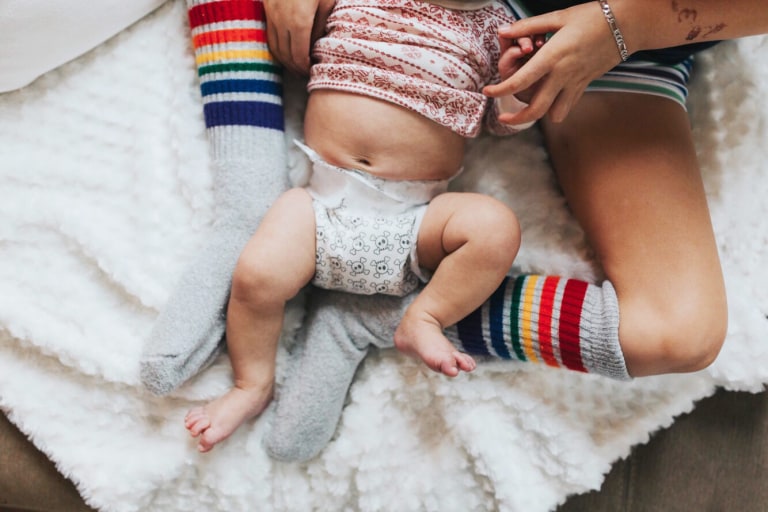
Cloth vs. Disposable Diapers
Are cloth diapers a good bet for your family? Like most things baby related, that depends.

Cloth diapers today aren’t like they used to be. Your grandmother’s pins and rubber pants have been replaced by easy-to-use all-in-ones with adorable prints and lots of styles. But are they the right fit for your family? Like most things baby, that depends. Here are the top pros and cons for the diaper debate.
Cloth Diapers
Pros
Cost: One big advantage of cloth diapers is savings. Since you are reusing the diapers and don’t have to constantly buy more, the savings adds up—especially if you end up using them for more than one baby. For just one kid, Consumer Reports estimates that families save $1,500 to $2,000 by the time the baby is potty trained. Whoa!
If you opt for a cloth diapering service to cut down on the time dealing with the mess, then these savings are lost.
Environmental Impact: Since you reuse them, cloth diapers are not going to the landfill. (There’s some recent debate about this since it still takes energy to make the cotton diapers and then launder them over and over again, especially in water-insecure places like California.)
Makes Potty Training Easier: Some parents claim that potty training cloth diapered babies is easier because the babies are more uncomfortable in cloth, and thus more easily transition to undies.
Cons
Ease of Use/Time: Cloth is more time-consuming. Even newer hybrids or pocket models (like the ones from Charlie Banana, GroVia or BumGenius) still require more work from the person doing the diaper changing than just rolling it up and throwing it in the diaper pail.
How hard is washing? Check out how to clean cloth diapers for the full explanation in three easy steps.
Travel/Daycare Limitations: When you are on the go, changing a cloth diaper (and then carrying around the dirty diaper) can be complicated and gross. There are some great new wet/dry bags to make this much easier. Also, some daycares frown on cloth diapers, and going back and forth from disposables during the day and cloth at night is not the easiest for babies or their caretakers.
Disposable Diapers
Pros
Ease of Use/Time: Take it off, roll it up, throw it away. Disposable diapers cannot be easier.
Portable: It’s easy to bring a diaper with you to the park or to grandma’s and not worry about toting it around.
Cons
Environmental Impact: It takes energy and natural resources to make the thousands of diapers that a baby will go through in the first couple years. And then they just wind up in the landfill. Also, many diapers contain dioxins that are bad for the environment (and maybe for baby).
Some diapers, like Bambo Nature, are certified by Nordic Swan Eco-Label and the Forest Stewardship Council, so you know they’re made responsibly. And they’re biodegradable. If you have municipal composting, throw them in there. Even if they do wind up in the landfill, at least they won’t last til 2500 and beyond.
Fair-Weather Cloth Diapering?
Feel guilty about the environmental impact, but don’t want to fully commit to a cloth lifestyle?
You could buy a small starter pack of cloth diapers to use at home, but keep some disposables for when you travel, take baby around town or at night. If cloth diapering is easier than it seems, you could wind up sticking with it.
